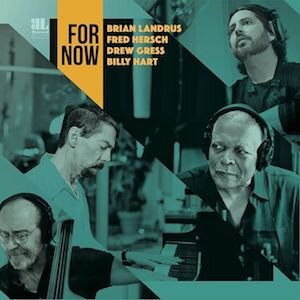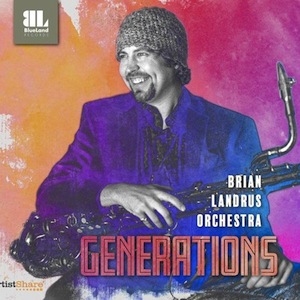Label: Palmetto Records, 2022
Personnel - Brian Landrus: baritone saxophone, bass clarinet, flutes; Ryan Keberle: trombone; Nir Felder: electric guitar; Geoffrey Keezer: Rhodes, organ, piano, synth; Lonnie Plaxico: electric and acoustic bass; Rudy Royston: drums; John Hadfield: percussion. Guests - Jaleel Shaw: alto saxophone (#5,14); Ron Blake: tenor saxophone (#2,9,10); Steve Roach: trumpet, flugelhorn (#1,4,7,12,15); Corey King: vocals (#1,6,11).
Boasting an authoritative language, baritonist Brian Landrus wades in his typical aesthetic variety with some big hooks and a non-aggressive posture despite the massive tone of his instrument. His new recording, Red List, finds him well supported by highly committed bandmates and special guests who embrace the amiable nature of the compositions with devotion. The main topic of this body work is Earth’s endangered species and climate crisis.
“Canopy of Trees” plunges into the pop/rock canon with the presences of Nir Felder’s rock-steeped guitar crunch, Lonnie Plaxico’s electric bass reassurance, Geoffrey Keezer’s scattered keyboard waves, and Rudy Royston’s fidgety drumming. The baritone solo, clear at all times and never chewy, is dovetailed by an unison-delivered theme that includes trombonist Ryan Keberle and trumpeter Steve Roach. The type of energy created here opposes to the brighter and glossier feel of “The Distant Deeps”, a waltz with vocals by Corey King and solos from trombone and flute. It also deflects from a pair of reggae/dub incursions, namely “Save the Elephants” (the title refers to an organization with which Landrus is working) and “Leatherbacks”.
The Steely Dan-like title cut is a sleek, streamlined fusion affair built on elements of rock, jazz, R&B, and funk. Landrus, who hits the bottom notes with unshakable confidence, is followed by the tenorist Ron Blake, who is even more impressive on “Bwindi Forest”, a modal jazz enterprise with beautiful piano playing as well as bass clarinet and saxophone bravura cutting through from both sides. This number takes us directly to “Congo Basin”, which, pivoting to a triple time feel, features a fine guitar stretch over the funk fringe that runs underneath.
Saxophonist Jaleel Shaw wields his alto with personality on “Tigris”, a more popish jazz push with a neat painterly touch that soon breaks and expands into a wider type of fusion. In turn, “Nocturnal Flight” offers clear and velvety balladry texturized by Felder’s adroit guitarism, and with Landrus on flute and baritone.
Delivered in a pretty straightforward way, these set of tunes systematically strip away any possible sonic discomfort or violent collisions. They are uncomplex in tempo and immediately accessible. Landrus sticks up to this posture while finding his own groove and fluency.
Favorite Tracks:
02 - The Red List ► 04 - Nocturnal Flight ► 05 - Tigris






